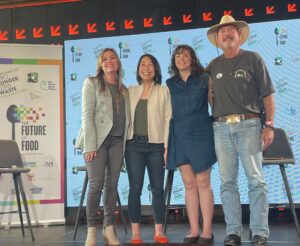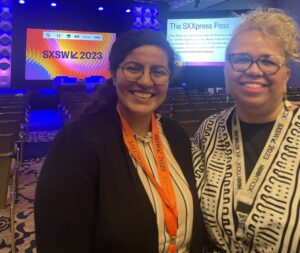
The energy on the streets of Austin during SXSW 2023 was palpable. People from all over the country and world came together to discuss breakthroughs and opportunities across a variety of sectors including one close to my heart – food.
The SXSW food track, the Future of Food, and All Things Food programming were focused on a wide range of topics from discussing the future of plant-based foods to addressing the concentration of commercial agriculture. My particular interest and focus were on the conversations about how to improve equitable food access to drive better health and well-being outcomes.
Chef Jose Andres, founder of World Central Kitchen, spoke early in the SXSW lineup about how a plate of food is more than just a meal. He shared the vision of a world where people come together across differences to listen and respond to community needs. His call to build longer tables not higher walls rang through my ears as I participated in two days of exciting programming about food access.
Below are a few of my takeaways from the SXSW panels and follow up conversations. These trends have opportunity to drive impact in communities around the country:
- Food access initiatives that focus on health can drive nutrition and dignity. Food as Medicine was a strong theme, with innovative nonprofits, grocery chains, and healthcare institutions discussing active solutions that connect people to healthy meals. Village Capital talked about how private investment in digital health and nutrition services like Foodsmart are being reimbursed through Medicaid. Kroger Health and local nonprofits like the Cook’s Nook are delivering nutritious, delicious, and culturally relevant foods directly to the doors of community members. Philanthropic investments are continuing to grow in this arena, with funders like Kroger Zero Hunger Zero Waste and the Rockefeller Foundation launching initiatives to lift solutions.

Natalie Marie Byrne – moderator, Emily Ma – Google Food for Good, Katy Hart – ReFed, Mike Meyer – FarmLink Project - Technology and data insights can make food access more dignified and efficient. Nonprofits on the front lines of addressing food insecurity could augment their impact by adopting technologies that make their processes more efficient and reach more people. U.S. Hunger is building tools to empower nonprofit leaders with the data needed to make the case for their great work. This also can shift the impact narrative from pounds received and meals delivered to positive changes in health and well-being outcomes. Redstone clients like Plentiful are also building tools to improve the experiences of neighbors by creating a platform for their voices and making it accessible to other stakeholders in the food system. Technology is also fostering collaboration such as ReFed’s Slack community that allows people to connect freely and highlight food they need help moving.
- Food policy is aligning incentives, enabling community solutions to address food waste and hunger. Advocacy of groups like the Healthy Living Coalition helped pass the Food Donation Improvement Act. This federal legislation enhances the coverage of the Bill Emerson Good Samaritan Food Donation Act to promote food donation. The protections now allow schools, restaurants, and other food organizations to donate food directly to individuals.
- Improvements in the uptake of school meals can improve quality and access for all. Hallie Casey from the Sustainable Food Center in Texas spoke about how students are often split at school based on what they eat – healthy meals from home, free and reduced lunch, etc. However, if more meals are eaten at school, the food can be better. In Austin, if every student ate lunch at school once a week, the district could afford grassfed beef for all. If twice a week, the district could secure all organic produce. If three times a week, the students would have organic milk. States across the country are innovating in sourcing healthy food for school meals including prioritizing local purchasing and exploring cooperative purchasing models for community wide solutions.
- A regional focus on food access and healthy eating can bring together communities and improve the impact on our planet. Chef Sophia Roe, in conversation with Ami McReynolds, the Chief Equity Officer of Feeding America, spoke to the food trends that are changing our planet. They highlighted community initiatives like Dion’s Chicago Dream that are providing fresh local produce to food deserts in Chicago. This regional focus allows communities to focus on driving three pillars of food justice: healthy food, sustainability, and justice for food workers.
I left SXSW inspired by all the individuals driving healthy, culturally relevant, and delicious food access. Emily Ma from Google’s Food for Good team said, “we must believe we can solve hunger in our lifetimes.” The community’s passion driving work up and down the food system is what makes me believe.
